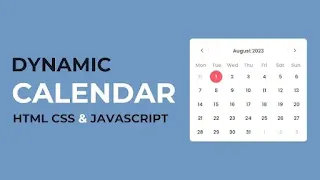How to Create a Calendar Using Java, HTML, and CSS
How to Create a Calendar Using Java, HTML, and CSS
Creating a calendar application can be a rewarding project for those interested in web development and programming.
In this Article, we'll explore how to build a simple calendar using Java for the backend logic, HTML for the structure, and CSS for the styling.
Prerequisites
- Basic knowledge of Java, HTML, and CSS
- A development environment set up with Java, such as IntelliJ IDEA or Eclipse
- A text editor for HTML and CSS (e.g., Visual Studio Code)
Step 1: Set Up Your Java Backend
We'll use Java to generate the calendar data. Create a simple Java program that outputs the current month's calendar in a format that can be easily rendered in HTML.
Java Code
import java.util.Calendar;
public class CalendarGenerator {
public static void main(String[] args) {
Calendar calendar = Calendar.getInstance();
int year = calendar.get(Calendar.YEAR);
int month = calendar.get(Calendar.MONTH);
System.out.println("<table>");
System.out.println("<tr><th>Sun</th><th>Mon</th><th>Tue</th><th>Wed</th><th>Thu</th><th>Fri</th><th>Sat</th></tr>");
// Get the first day of the month
calendar.set(Calendar.DAY_OF_MONTH, 1);
int firstDayOfMonth = calendar.get(Calendar.DAY_OF_WEEK) - 1;
// Get the number of days in the month
int numberOfDaysInMonth = calendar.getActualMaximum(Calendar.DAY_OF_MONTH);
System.out.println("<tr>");
for (int i = 0; i < firstDayOfMonth; i++) {
System.out.print("<td></td>");
}
for (int day = 1; day <= numberOfDaysInMonth; day++) {
if (firstDayOfMonth == 7) {
System.out.println("</tr><tr>");
firstDayOfMonth = 0;
}
System.out.print("<td>" + day + "</td>");
firstDayOfMonth++;
}
// Fill the last row with empty cells if needed
while (firstDayOfMonth < 7) {
System.out.print("<td></td>");
firstDayOfMonth++;
}
System.out.println("</tr>");
System.out.println("</table>");
}
}
This program generates HTML code for a calendar table of the current month. It prints the table directly to the console.
Step 2: Create the HTML File
Create an HTML file to render the calendar generated by the Java program. Save it as index.html:
<!DOCTYPE html>
<html lang="en">
<head>
<meta charset="UTF-8">
<meta name="viewport" content="width=device-width, initial-scale=1.0">
<title>Calendar</title>
<link rel="stylesheet" href="styles.css">
</head>
<body>
<h1>Monthly Calendar</h1>
<div id="calendar">
<!-- Calendar HTML will be inserted here -->
</div>
<script>
fetch('calendar.html')
.then(response => response.text())
.then(data => document.getElementById('calendar').innerHTML = data);
</script>
</body>
</html>
In this HTML file, we use JavaScript to fetch and display the calendar HTML generated by the Java program.
Step 3: Create the CSS File
Create a CSS file to style the calendar. Save it as styles.css:
#calendar {
margin: 20px auto;
display: inline-block;
border-collapse: collapse;
}
table {
border: 1px solid #ddd;
width: 100%;
max-width: 600px;
background-color: #fff;
}
th, td {
border: 1px solid #ddd;
padding: 10px;
text-align: center;
}
th {
background-color: #f2f2f2;
}
This CSS file provides basic styling for the calendar table, including borders, padding, and colors.
Step 4: Running the Application
- Compile and Run Java Code: Compile the
CalendarGenerator.javafile and run it. Redirect the output to a file namedcalendar.html.javac CalendarGenerator.java java CalendarGenerator > calendar.html - Serve the Files: Place the
index.html,styles.css, andcalendar.htmlfiles in the same directory. Use a local server to serve these files, or simply openindex.htmlin your web browser. - View the Calendar: Open
index.htmlin your web browser. The calendar for the current month should be displayed, styled according to your CSS.
Conclusion
This guide provided a basic example of how to generate and display a calendar using Java, HTML, and CSS.
The Java program generates the calendar's HTML code, which is then inserted into an HTML page and styled with CSS.
You can further enhance this by adding more features such as navigation between months or integrating with a database for more advanced use cases.
